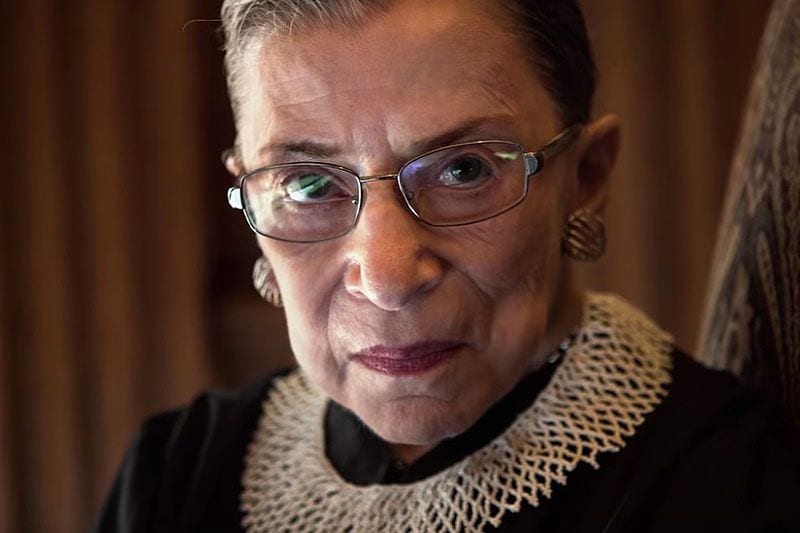
“I ask no favor for my sex. All I ask of our brethren is that they take their feet off our necks.” – Ruth Bader Ginsburg
For those interested in learning everything about Ruth Bader Ginsburg—the 85-year-old Supreme Court justice and feminist social media icon—here’s a fun fact to be gleaned from Betsy West and Julie Cohen’s breathlessly laudatory documentary RBG: According to her children, Ginsburg doesn’t know how to turn on her TV. This is a lifelong overachiever, a woman who made Law Review at Harvard in the ’50s when the number of the school’s female law students could be counted on two hands. Ginsburg is busy working out, attending the opera, and staying up until four in the morning working on cases and writing opinions. This is not a woman given to flipping channels looking for a Friends rerun.
So when the filmmakers show her Kate McKinnon’s goofy and hyperkinetic impression of the spry Justice on Saturday Night Live, it’s good to see the mostly taciturn Ginsburg giggle. After all, with liberals worried about the judge Donald Trump would put up to replace Ginsburg (which could be anyone from an ambulance-chaser he saw advertising himself on Fox to the ghost of Roy Cohn) and anxiety-studying things like her exercise routine and diet to reassure themselves of her longevity, any sign of good cheer and health breeds confidence.
RBG is an unabashedly living-hero-worshipping documentary whose subject seemingly deserves most of the glowing accolades heaped upon her. A ferociously hardworking Brooklyn kid, she married her college sweetheart and started raising a family while still in law school. After graduating from Columbia in 1959, she couldn’t find a job because no firms would hire women. In the absence of serious professional possibilities, she strategically redirected to teaching law at Rutgers, then taking on sex discrimination cases, and helping to start the Women’s Rights Project at the ACLU.
That move, discussed in the movie by Gloria Steinem among others, was the crucible in which Ginsburg found her calling. This was a time, as a stark graphic points out, when a woman still needed a man to open a bank account and when husbands could not be charged for raping their wives. The women’s rights movement had already started in America, but while attitudes might have been starting to change, the laws had not. In a series of cases brought in the ’70s, Ginsburg helped establish the legal framework needed for modern feminism to bring society in line with the equality guaranteed by the Constitution.
It’s an exciting stretch of footage, the most gripping of the entire movie. Ginsburg, who won five of the six cases she argued before the Supreme Court, said later that she considered herself a kind of “kindergarten teacher” who had to school the nine male justices in the realities of how women experience life as “second-class citizens”.
By the time we get around to hearing Ginsberg’s argument from the 1973 Frontiero v. Richardson case—her first time before the Supreme Court, where she advocated for a female Air Force officer denied a housing allowance because of her gender—and its quote from abolitionist Sarah Grimke, “I ask no favor of my sex. All I ask of our brethren is that they take their feet off our necks.”—her carefully considered words take on a historical ring. It seems possible that she was writing for the ages, and that she knew it.
The movie is unable, though, to sustain that momentum. Ginsburg makes for a riveting subject, her sharp thoughtfulness and sly cockeyed grins signaling deep intent and wry humor in almost everything she says. But too often the directors pivot away from her accomplishments on the legal battlefield to focus on her current iconic status. The youthful and adoring crowds we see at her events are not what one would imagine for an octogenarian legal scholar who speaks in a deliberate monotone. But the focus is too often on the enthusiasm of her fans and not enough on why they are so excited to see her and wear “Notorious RBG” merchandise. A staunch feminist like Ginsburg has clearly made enemies in the course of all her victories and also the slashing dissents she has issued during the court’s John Roberts era. But you would barely know it from this movie.
RBG has no interest in Ginsburg’s detractors and only enough in her adversaries to note that ones she remained cordial with. Conservative lawyer Ted Olson, who argued before the Supreme Court in favor of keeping Virginia Military Institute blocked to women, calls her a “worthy and formidable” opponent. Senator Orrin Hatch shows up to dish out some praise and plenty is made of Ginsburg’s deep friendship with her late fellow Justice, the intolerably retrograde paleo-conservative Antonin Scalia.
Other than that, the only glimpse we have of Ginsburg’s enemies are the disembodied voices that float over the opening credits’ Washington monuments montage: “Evil-doer”, “anti-American”, “zombie”. Ruth Bader Ginsberg has spent her lifetime studying the law and crafting the words needed to bring law into alignment with Constitutional principles of equality and justice. But by essentially removing her antagonists from the room, RBG leaves us only with an echo chamber of praise.

